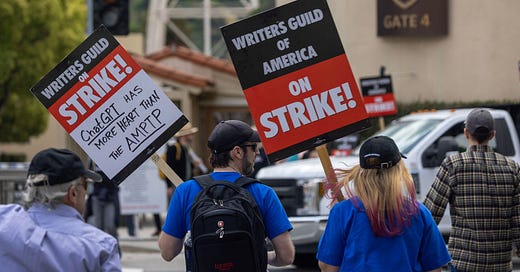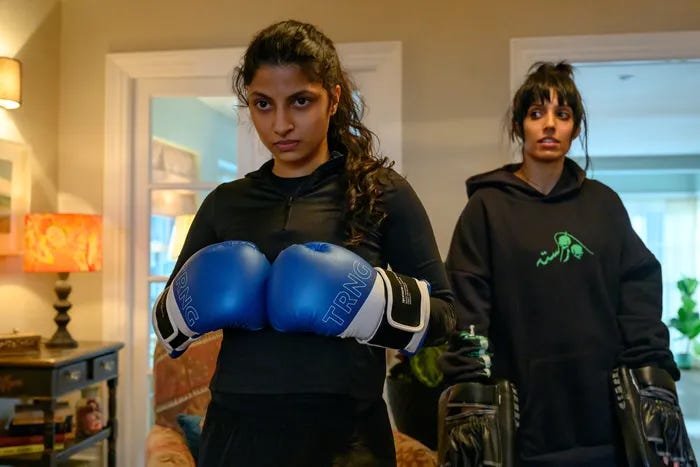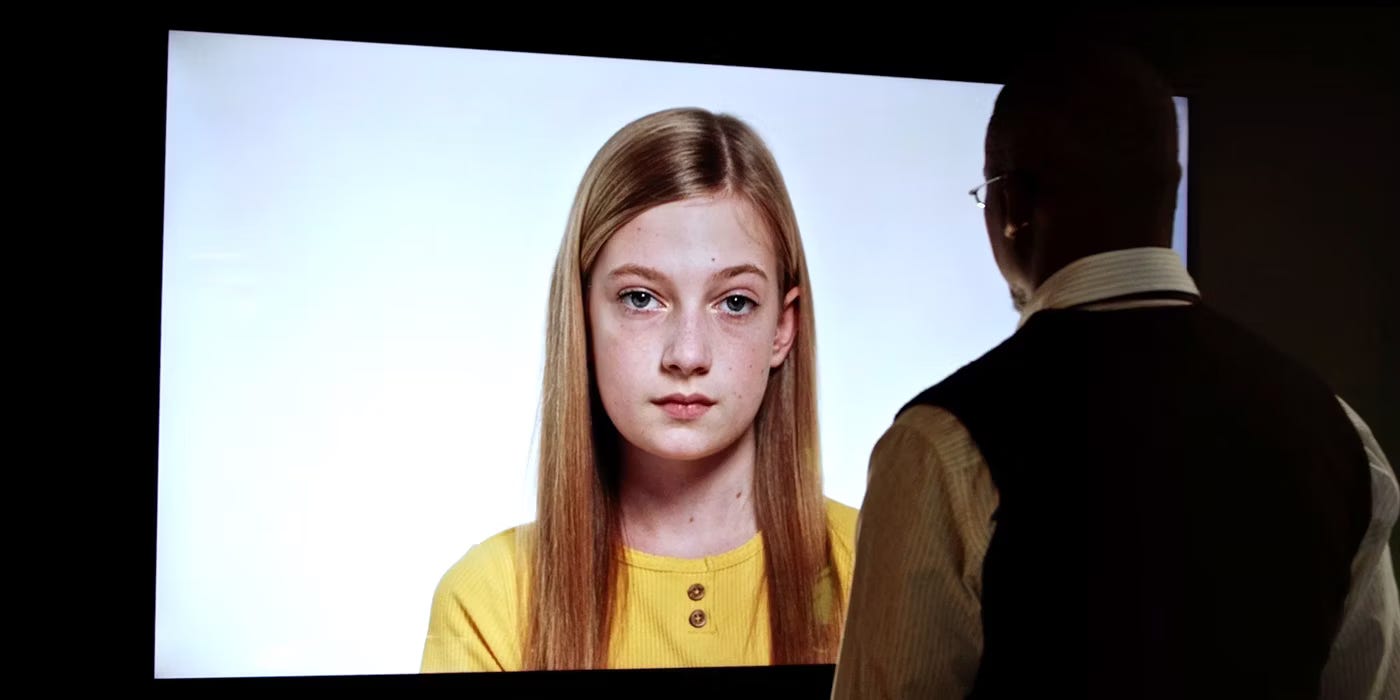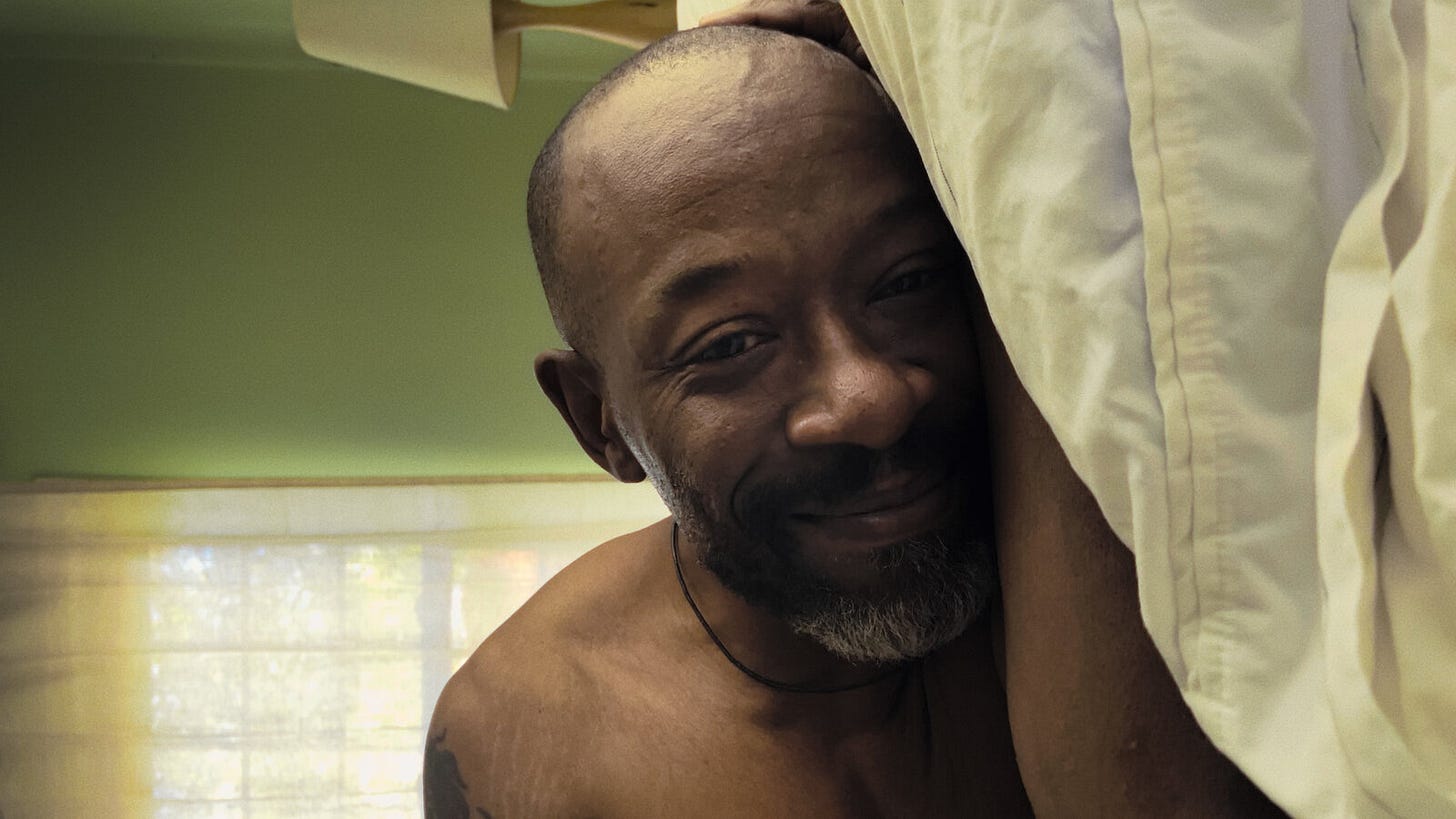What To Watch: Strike Edition
Support the WGA: Watch movies about AI rather than ones made by AI.
It’s always the worker bees who lose out on the honey whenever a technological upheaval hits the media industry. The writers of the Writers Guild of America – the women and men who pen the screenplays for the movies you love (or loathe) and the television series you binge – went on strike this week because, while they’re busier than ever creating TV’s new Golden Age, they’re seeing less and less of the gold. You can find any number of online Baedekers to explain the impasse between the WGA and the Alliance of Motion Picture and Television Producers (AMPTP): Alissa Wilkinson does an excellent job at Vox, and Deadline has an entire feature well devoted to the strike, with Tom Tapp laying out just the FAQs. The over-arching issue is that content corporations are making crazy money from video on demand and not enough of it is trickling down to the people who make the movies and shows. And not just the writers: The Directors Guild and the actors of SAG-AFTRA have contracts that expire June 30, and they’re all watching the WGA developments closely.
Related issues are that the combination of the pandemic and the new rules of the streaming workplace have producers cutting back on the number of writers, the length of employment, and the ability to advance. Basically, the WGA claims, their industry is becoming a gig economy, one that may be sustainable for the most successful creators in the business but doesn’t allow the majority a basic standard of living.
And that’s leaving out the matter of artificial intelligence and attendant fears that producers will pay writers for ideas only to show them the door and feed their pitches into ChatPGP. (A version of this may already be happening; in any event, expect the AMPTP to experimeng with AI while the scribes are on the picket line.) In a published WGA two-pager listing the union’s demands and the producers’ response as of May 1, here’s what the writers requested: “Regulate use of artificial intelligence on MBA [Minimum Basic Agreement] covered projects: AI can’t write or rewrite literary material; can’t be used as source material; and MBA-covered material can’t be used to train AI.”
Here’s what the AMPTP counteroffered: “Annual meetings to discuss advancements in technology.” In other words, don’t worry about AI taking your jobs, folks – we’ll meet with you once a year to let you know what’s up.
So, yeah, strike. The late-night shows and “Saturday Night Live” have already blinked off and the daily soaps will be next; then scripted series will be affected in a slow roll-out that may eventually engulf feature film production. The worst thing to consider? The last time the WGA struck, in 2007-2008, the producers responded by increasing their reliance on unscripted programming – reality TV shows. And you know how that turned out. Those things are harder to get rid of than bedbugs.
I suppose the best way to support the strikers would be to cancel all your streaming subscriptions until the WGA has a deal. More realistically, take a break from TV series or that giant studio superhero sequel that’s opening in theaters this weekend in favor of real movies, old and new. (So advises the critic who writes a movie newsletter.) Here are this week’s recommendations:
In Theaters:
“Polite Society” (⭐ ⭐ ⭐), of which I wrote when it played at Sundance: “Cute but exhaustingly over-the-top British action-comedy from first-time writer-director Nida Manzoor about a Pakistani teenager who dreams of being a stuntwoman and who plots to rescue her sister from an arranged marriage. Lead actress Priya Kansara is energetic and adorable, and the various comic martial-arts showdowns position this as a Bollywood-style version of ‘Scott Pilgrim vs the World’ with a dash of Jane Austen.” It’s a crowd pleaser, certainly, and Manzoor and Kansara are talents to watch.
On Demand:
Return to Seoul (⭐ ⭐ ⭐ ⭐), one of the best films of 2022 (the best film of 2022, according to the Boston Society of Film Critics), can now be had for a $6 rental on Amazon, YouTube and other platforms. I wrote about it at length when it came to theaters in March and cannot recommend it more highly.
”The Artifice Girl” (2022, ⭐ ⭐ ⭐, for rent on Amazon, Apple TV, YouTube, and elsewhere), from writer-director-actor Franklin Ritch, is tiny in scale but ambitious in concept, and it’s smarter and more thought-provoking than most movies with ten times the budget (which, admittedly, is still peanuts). The subject, curiously enough, is artificial intelligence, with Ritch playing a scientist whose AI program mimics an 11-year-old girl (Tatum Matthews) for the purposes of bringing online predators to justice. As with all cautionary tech tales, the creation becomes smarter and maybe even more human than the creator, but “The Artifice Girl” isn’t a horror movie, despite what the trailer below strains to sell it as. Rather, it’s a surprisingly tender drama of ideas that at times reminded me of a variation on the 2001 Spielberg/Kubrick film “A.I. Artificial Intelligence.” On one hand, the movie mostly consists of actors in rooms talking. On the other, Ritch establishes an epic time scale that flatters an audience’s intelligence and sense of wonder, and he’s gracious enough to bring on 82-year-old Lance Henriksen (“Aliens”) as his character’s older self.
“There There” (streaming on Hulu, for rent elsewhere, ⭐ ⭐ 1/2) is worth a look for followers of the wayward career of director Andrew Bujalski, who has veered into the mainstream with films like 2018’s wonderful “Support The Girls” – which if you haven’t seen, proceed immediately to HBO Max, where it’s streaming – and disappeared into the nearly experimental with 2013’s “Computer Chess.” “There There” is somewhere in the middle and very much a product of the early days of the COVID pandemic, which makes it seem oddly dated: A series of linked two-character scenes in which all the actors were filmed separately, none of them in the same shot. That says something about the bubbles of isolation we all found (and find) ourselves in, but it’s not entirely clear what. About half the vignettes are keepers: A morning after a one-night stand starring Lennie James (above) and the always welcome Lili Taylor, a hilariously tense parent-teacher conference between a bulldog mom (Annie LaGanga, priceless) and an inexperienced young teacher (Molly Gordon), and an unnerving collision between James’ bar owner and the young teacher, who’s now very drunk. The other scenes play like actors’ exercises, but these ones play like good actors’ exercises.
If you really want to know what can be done with the two-hander anthology format, toddle off to Jim Jarmusch’s “Coffee and Cigarettes” (2003, ⭐ ⭐ ⭐ 1/2), which is streaming on HBO Max and has a higher ratio of hits to misses. And that cast! In order: Roberto Benigni, Steven Wright, Steve Buscemi, Iggy Pop, Tom Waits, Cate Blanchett, The White Stripes, Steve Coogan, Alfred Molina, the Wu-Tang Clan, and Bill Murray – all sitting around drinking the aforementioned coffee, smoking the aforementioned cigarettes, and leading each other in curlicues of Zen comedy. The best vignettes are “Cousins,” with Blanchett playing both herself and an annoying non-famous relative, and “Cousins?,” in which a wheedling Molina reveals a family connection to the pompous Coogan and the power dynamic deliciously swings from one man to the other. Oh, hey, look, both scenes are on YouTube for free – an even better way to stick it to the AMPTP.
Some other repertory finds to while away the weekend on the streaming platforms:
On Netflix: “Starship Troopers” (1997, ⭐ ⭐ ⭐) Twenty-five years old and still scrambling moviegoers’ brains, this eternally misunderstood intergalactic war movie is exactly what happens when you take a fascist science fiction novel (Robert A. Heinlein, 1959) and hand it to a director, Paul Verhoeven, who not only experienced actual fascism as a child in WWII Amsterdam but knows how to make a satiric propaganda recruiting poster so finely tuned that most people miss the joke (including, apparently, the people who made the preview below). Although when Neil Patrick Harris, fresh off of “Doogie Howser, M.D.,” shows up in an SS trench coat, it’s hard not to realize you’re being played, and played hard. Verhoeven remains one of the great subversives of modern commercial moviemaking – good lord, I’d love to see him make a Marvel movie – and this is his sneaky dismantling of “Top Gun” and high Hollywood jingoism. Although maybe the best way to look at “Starship Troopers” is as the movie “Star Wars” would have been if Germany had won World War II.
On Amazon Prime: “True Grit” (2010, ⭐ ⭐ ⭐ ⭐) One of the very few remakes to improve upon the original – the 1969 John Wayne original is a fine nostalgic frolic, but it’s not half the movie this is. “Grit” came at the end of a run of Coen brothers masterpieces (“No Country For Old Men,” “A Serious Man”) and stands as a jaunty picaresque that slowly and assuredly steps into the eternal. That final night ride and the film’s coda haunt some of us still.
On HBO Max: “American Honey” (2016, ⭐ ⭐ ⭐) Andrea Arnold’s hazy, impressionistic, and often very moving drama of rootless young people forming a provisional family as they travel across the country selling magazine subscriptions and trying out their hustles. Back when I reviewed it for the Boston Globe, I wrote, “Is the movie overlong? My, yes, a soak that leaves your fingers good and wrinkled. Does it have its excesses? You bet: too many wildlife shots of butterflies, too much hand-held wooziness, too much Shia LaBeouf (and I like Shia LaBeouf, even if you don’t). But ‘too much’ — the blissful, scary overload of experience unbound — is what ‘American Honey’ wants to capture like a lightning bug in a bottle. At times it feels as if Arnold has remade Larry Clark’s ‘Kids’ for a more hopeful century, or ‘Spring Breakers’ with real people instead of carnivorous cartoons. She dares to look at the tribalism of our coming generations with something like faith.”
On Hulu: “Best in Show” (2000, ⭐ ⭐ ⭐ 1/2). If you have a dog, you’ve probably already seen Christopher Guest’s peerless comedy set in the pampered, neurotic world of show pooches and their owners. In fact, you’ve probably seen it two or three times. But do you really need an excuse to see it again? If you haven’t seen the movie, go get a dog from the shelter, bring him or her home, and the two of you can howl along with Eugene Levy and Catherine O’Hara (road-testing the Schitts 15 years ahead of schedule), Parker Posey, Jennifer Coolidge, Jane Lynch, and – glory of glories – Fred Willard as the worst color commentator in the history of broadcast sports.
On The Criterion Channel: A groaning board of festivals for May, including a tribute to Jennifer Jason Leigh that rounds up a diverse group of movies this most challenging of actresses has appeared in: “Miami Blues” (1990, featuring Alec Baldwin’s breakout performance), Alan Rudolph’s 1994 Algonquin Round Table love letter “Mrs. Parker and the Vicious Circle,” and Charlie Kaufman’s “Synecdoche, New York” (2008), a movie to get lost in alongside Leigh and Philip Seymour Hoffman. Also on Criterion: a 14-film package of movies directed by Seijun Suzuki, the madman of gonzo 1960s Japanese B-movies – start with “Tokyo Drifter” (1966) or the following year’s “Branded To Kill,” a film so deranged it got Suzuki blacklisted from his own studio. And the channel’s festival of Iranian filmmaker Abbas Kiarostami’s “childhood films” collects a number of rarities from the 1970s and is highlighted by “Where is the Friend’s House?” (1987), a transcendent humanistic fable that sits in this critic’s all-time Top 10 list.
Thoughts? Don’t hesitate to weigh in.
If you enjoyed this edition of Ty Burr’s Watch List, please feel free to pass it along to friends.
If you’re not a paying subscriber and would like to sign up for additional postings and to join the discussions — or just help underwrite this enterprise, for which the management would be very grateful — here’s how.







